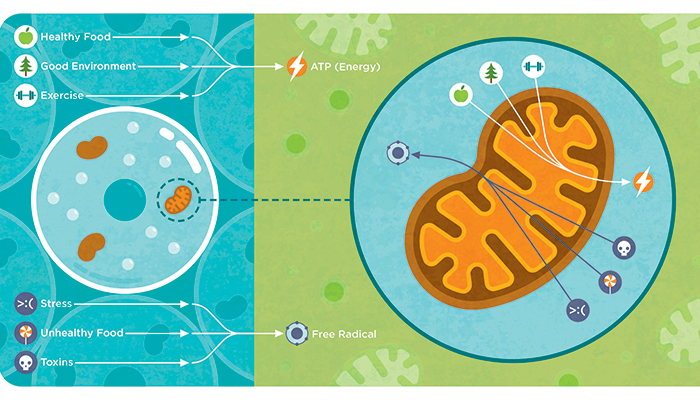The mitochondria are your body’s cellular energy factories. They can make or break your metabolism, aging, immunity, mental focus — and more.
Caring for your mitochondria is one of the fundamental ways you can improve and maintain your health. The following lifestyle based strategies will protect your mitochondria, safeguarding your ability to generate energy and remove toxins while protecting your brain. For more aggressive, therapeutic strategies aimed at mitochondrial or neurodegenerative disease, consult a physician with an expertise in functional medicine,
- Do strength training and high-intensity interval training (HIIT). Both can increase the number, and the function of your mitochondria. The better your muscle mass and cardiovascular conditioning, the better your mitochondria will fare, and the more powerfully they will perform.
- Eliminate foods that are most toxic to your mitochondria, including foods containing gluten, dairy products, and all foods sweetened with sugar, high-fructose corn syrup, or other refined sweeteners.
- Eat nine servings of fresh vegetables and fruits daily. Terry Wahls, MD, recommends a variety of greens (broccoli, bok choy, etc.), brightly colored vegetables (beets, carrots, etc.), and sulfur-rich veggies (cauliflower, cabbage, etc.). Wahls recommends blending your mitochondrial-building veggies and fruits in a daily smoothie.
- Eat fiber-rich foods, including whole grains, to help you detox the poisons that can build up when mitochondria slow down.
- Increase the level of omega-3 fats in your diet to help build your mitochondrial membranes. Wahls recommends consuming 6 to 12 ounces of grassfed meat or wild-caught fish a day as an easy way to up your omega-3s.
- Consider making bone broth. When mitochondria are compromised, there is increased risk for autoimmune diseases like arthritis. Often people take supplements like glucosamine or chondroitin or pay for costly joint injections. But Wahls says a broth made of bones with the cartilage and tendons attached have more glucosamine than supplements, and provide a healthy form of fat as well. (Learn how to make your own bone broth here.)
- Take mitochondria-protective and energy-boosting micronutrients, such as acetyl-L-carnitine, alpha lipoic acid, coenzyme Q10, n-acetylcysteine, NADH, D-ribose, resveratrol, and magnesium aspartate.
Read more about “The Care and Feeding of Your Mitochondria.”




This Post Has 0 Comments